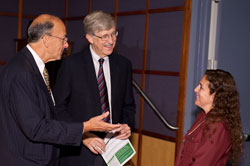Global Health on campus gains enthusiasm
September - October, 2009 | Volume 8, Issue 5
When today's university administrators were going to school, student demands were about politics or campus living conditions. Today, the demands of students are purely academic - more courses in global health, the hottest field in academia.
The numbers are staggering. Enrollment in global health programs in universities across the United States and Canada doubled in just three years due to a surging interest in careers that address health disparities and prevent the spread of disease in developing countries.
A survey of 37 institutions conducted by the Consortium of Universities for Global Health found:
- The number of undergraduate students enrolled in global health grew from 1,286 to 2,687 between 2006 and 2009.
- The number of graduate students enrolled has more than doubled from 949 in 2006 to 2,010 this year.
- Student organizations focused on global health now number 105, an average of almost three on each campus.
- The 37 universities offer a combined 302 programs that have been in place for at least one year in 97 countries.

Photo by Will Kirk, Johns Hopkins University
Fogarty Director Dr. Roger I. Glass introduces NIH
Director Dr. Francis Collins to longtime Fogarty grantee
Dr. Patricia Garcia, of Peru’s Cayetano Heredia
University.

Boston University associate provost and former
Fogarty director, Dr. Gerald Keusch (center),
catches up with Fogarty staffers Dr. Ken Bridbord
(left) and Dr. Flora Katz (right) during the Consortium
meeting at NIH.
Academic leaders at the Consortium's recent annual meeting at the NIH were concerned about the budgetary and structural challenges facing university global health programs, but they marveled at today's students.
"I think our current young generation has an unconsummated desire for sacrifice and service," says Dr. Michael Merson, director of the Duke University Global Health Institute.
University of Washington President Mark. A. Emmert explains the demand from the point of view of a self-described Baby Boomer:
"Our generation of college students was a generation that said, 'We don't want to live in a nation where people have different rights and opportunities.' Our students seem to be saying, 'I don't want to live on a planet that doesn't provide those same kinds of opportunities.'"
At Emory University, global health has become the largest undergraduate minor on campus less than two years after it was established, with students representing 15 different majors. At its Rollins School of Public Health, more applications are received for global health graduate programs than for any other.
"Programs in global health are attracting students from across the University with a wide range of interests, including health sciences, business, law, theology, and liberal arts disciplines," says Emory's Dr. Jeffrey Koplan.
The University of Maryland's School of Public Health - while comprising more than just global health - has seen undergraduate majors increase from 757 to about 1,600 in just five years, says Dean Robert Gold, noting that his university president has challenged all students to engage in some kind of international experience.
One thread running through the two-day CUGH meeting was trying to define what a seamless global health education program ought to be - to the satisfaction of faculty in narrow disciplines, students seeking a broader education and funding agencies that will support both.
The question was defined by Dr. Timothy F. Brewer of McGill University as, "What basic minimum information - whether you're going to be a plastic surgeon, or you're going to be a family practice doc or you're going to be a biochemist - should you have heard of in global health? ... What is the equivalent every medical doctor should know about the burden of diseases?
Specific criteria have yet to be developed, and some conference participants expressed the notion that standardizing a list of competencies may be antithetical to another popular notion that experts in a field ought to do what they do best.
Happily, global health is a field where student demand is actually matched with increasing job opportunities, says Dr. Gerald Keusch, a former Fogarty director and now associate provost for global health at Boston University.
"The job market is, in fact, growing as more and more money is coming into bilateral, multilateral and major global health programs," he says. "There is a need for experience in the developing world, in government and in the private sector." More Information
To view Adobe PDF files,
download current, free accessible plug-ins from Adobe's website.